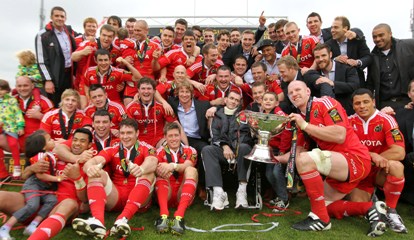No sooner had the champions of Europe been beaten and the Magners League title recaptured at the end of a magnificent Grand Final than father and son had been thrust on to the podium for the crowning glory.
Darbyshire's four-year stint on the coaching staff of the new champions ended in tragic circumstances two months ago when a terminal illness made it physically impossible for him to continue. That the 41-year-old from Wigan, whose move to Cork ended an 18-year career in Rugby League with Warrington Wolves, had kept going until then said everything about his courage.
He had been diagnosed with Motor Neurone Disease last October and watched the final showdown against Leinster from the touchline in a wheelchair. Darbyshire and his family spent the day with Munster, at the team hotel, then at the stadium, his very presence an inspiration to Paul O'Connell and his team.
As soon as they had finished generating the ferocity which proved too much for the Heineken Cup holders, Munster made a point of honouring their former strength and conditioning coach. Ronan O'Gara pushed Darbyshire on to the pitch for the presentation ceremony at an ecstatic Thomond Park.
O'Connell, mighty thankful for a winning flourish after being knocked out of both European competitions, took seven-year-old Jack Darbyshire on to the stage to hold the trophy while his father sat with the players. The difficulties Munster encountered during the season pale into insignificance compared to Darbyshire's cruel fate.
'Paul did so much for rugby in this part of the world and we wanted to show our appreciation,' a Munster spokesman said. 'We wanted to make it as special as possible for Paul and his family.'

Paul and Jack Darbyshire were at the centre of the celebrations
They did so in vintage Munster fashion, overwhelming Leinster as much by sheer passion as anything else. In doing so they sent their provincial neighbours back to Dublin with a sharp reminder that their conquest of Europe does not quite extend to the banks of the Shannon.
They also showed that when it comes to staging a Grand Final, nobody does it better than Limerick. The city put its heart and soul into the event with a passion which defied anyone to beat it. The main streets, bedecked mainly in Munster red, made it feel like a celtic Mardi Gras.
They rose to the occasion on the pitch as we all knew they would in a manner worthy of teams responsible for winning four of the last six Heineken finals. The match itself showed why Irish rugby is setting the pace in Europe and why the national team will surely be the best Six Nations bet at the World Cup in New Zealand come September.
Both Munster and Leinster featured 15 Irishmen at Thomond Park which made for a total of 30 out of a playing cast of 39. Munster had four non-Irish - Doug Howlett (New Zealand), Lifeimi Mafi (Samoa), Wian du Preez (South Africa) and Paul Warwick (Australia). Leinster's non-Irish ran to five - Isa Nacewa (Fiji), Nathan Hines (Scotland), Heinke van der Merwe, Richardt Strauss (South Africa) and Stan Wright (New Zealand).
The quality of the Irish involved is difficult to overstate. If Lions were rather thin on the ground at Twickenham for the Saracens-Leicester decider, they were all over the place at Thomond.
There were 10 all told - O'Connell, Keith Earls, O'Gara, John Hayes, Donncha O'Callaghan for Munster; Brian O'Driscoll, Shane Horgan, Luke Fitzgerald, Jamie Heaslip and Hines for Leinster who also have future Lions in Sean O'Brien, Jonny Sexton and Richardt Strauss on the basis that he will have qualified for Ireland before the next British-and-Irish tour, to Australia in 2013.
In raising their game to a level above the rest, except Munster on Grand Final day, no praise can be too high for Leinster. Their discipline, too, has been top notch - a mere 11 yellow cards in 33 matches all season, some of them against the very best in France and England.
The Millennium Stadium and an unforgettable Heineken final may have been the hardest of acts to follow but Thomond Park and the Magners League managed it in their own way.
Limerick rules the roost as undeniably the capital city of Celtic rugby.














